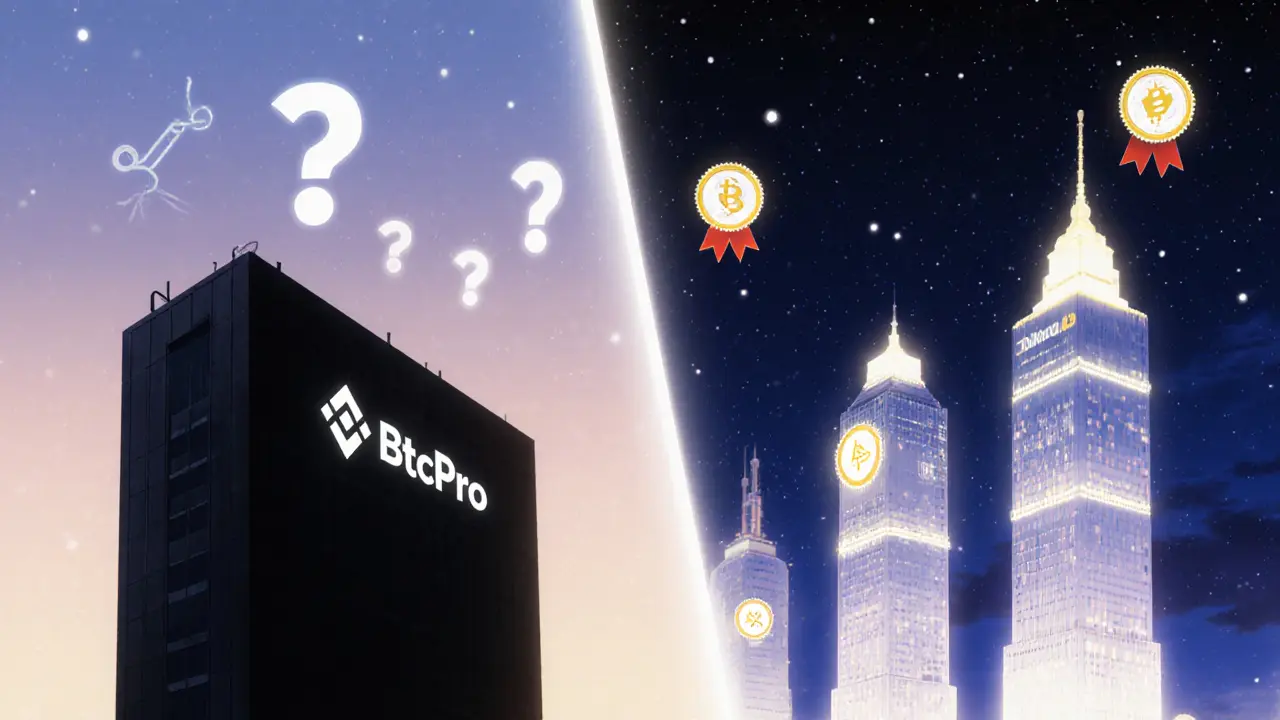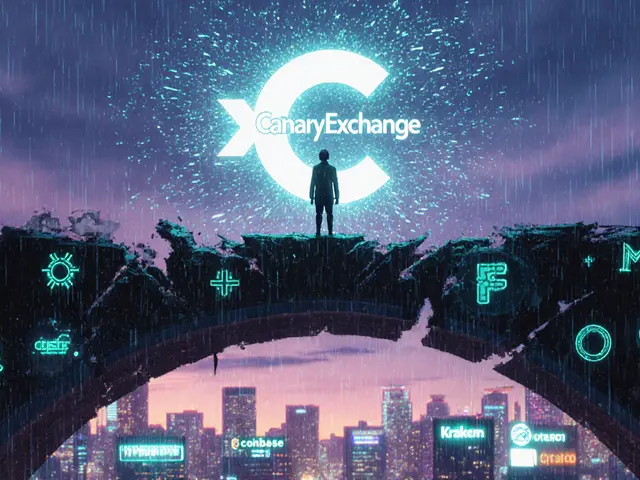Crypto Exchange Safety Checker
This tool helps you assess the safety of cryptocurrency exchanges by evaluating key trust indicators. Enter your exchange details to receive a safety score based on industry standards and best practices.
Safety Assessment Form
Select all safety indicators present in the exchange you're considering:
Safety Assessment Result
Based on your selections, this exchange shows strong security and compliance measures.
Key findings:
Quick Takeaways
- There is no verifiable licensing or security certification for BtcPro review as of Oct2025.
- Similar‑named platforms like BitoPro are regulated, while fraud cases such as TBAAPro.com show how easy names can be abused.
- Use a due‑diligence checklist before depositing any funds.
- Consider established alternatives (Binance.US, Crypto.com, Bitkub) for better protection.
- Never trust a platform that cannot provide transparent contact info or audit reports.
When you search for "BtcPro" you’ll find a handful of vague websites that promise cheap crypto trades but give almost no concrete data. This review walks through everything you can verify about the exchange, highlights red flags, compares it with well‑known services, and hands you a practical checklist to decide whether to trade on BtcPro or walk away.
What is BtcPro?
BtcPro is a cryptocurrency exchange platform that has surfaced online under the claim of offering low‑fee Bitcoin and alt‑coin trading. The service provides a web portal and mobile app but, as of October2025, it lacks publicly verified licensing, security certifications, or a clear corporate registration. The homepage lists popular coins (BTC, ETH, USDT) and advertises instant deposits, yet none of the usual compliance badges (e.g., ISO 27001, AML, KYC) appear.
How BtcPro Positions Itself
According to the marketing copy, BtcPro promises:
- "Zero‑fee" spot trading for major cryptocurrencies.
- Lightning‑fast withdrawals via QR‑code wallets.
- A “secure, stable, user‑friendly” experience aimed at beginners.
Unfortunately, the site does not publish any third‑party security audit, nor does it list a physical address, registration number, or a responsible financial authority. In the crypto world, the absence of these details is a major warning sign.

Red Flags & Missing Information
Below are the most common trust indicators for a legitimate exchange and the status for BtcPro:
| Indicator | Status |
|---|---|
| Regulatory license (e.g., ASIC, FinCEN) | Not disclosed |
| ISO 27001 certification | Absent - no mention of ISO 27001 |
| AML/KYC compliance | Unclear - generic “identity verification” without details |
| Insurance or custodial partner | None listed |
| Publicly audited smart‑contract code | Not provided |
| Customer‑support channels (live chat, phone) | Only a support ticket form |
| Transparent fee schedule | Vague “zero fee” claim, no breakdown |
In contrast, platforms like BitoPro openly display ISO 27001 and AML declarations, while Binance.US and Crypto.com provide detailed regulatory filings and insurance coverage.
Comparison with Established Exchanges
| Feature | BtcPro | Binance.US | Crypto.com | Bitkub |
|---|---|---|---|---|
| Regulatory license | None listed | NYDFS & State‑by‑State | CySEC, FCA (EU) | SEC‑registered Thailand |
| Security certifications | None | ISO 27001, SOC 2 | ISO 27001, HIPAA level | ISO27001 |
| KYC/AML | Basic email verification | Full ID + source‑of‑funds | Full ID + facial scan | Full ID + AML declaration |
| Deposit methods | Bank transfer (unverified) | ACH, debit card, USDC | 20+ fiat, credit cards | Bank transfer, cash‑in via 7‑Eleven |
| Trading fees | 0% advertised (no breakdown) | 0% maker, 0.1% taker | 0% on Level Up, otherwise 0.4% | 0.2% taker, 0% maker |
| Insurance / custodial protection | None | USD 1B insurance fund | USD 150M coverage | Insurance via BitGo |
| Customer support | Ticket form only | Live chat, phone | 24/7 chat, phone | Phone + chat |
The table shows that BtcPro falls short on almost every safety metric that seasoned traders rely on. If any of those columns matter to you - which they should - you’ll likely find a more reliable alternative.
Due‑Diligence Checklist for New Exchanges
- Verify the company’s legal registration (search the corporate registry of the claimed jurisdiction).
- Look for recognized security certifications (ISO27001, SOC 2) and request audit reports.
- Confirm AML/KYC procedures - a reputable exchange will outline the documents required and explain how data is stored.
- Check for custodial insurance or a partnership with a known custodian (e.g., BitGo, Coinbase Custody).
- Read user reviews on independent forums (Reddit, Trustpilot) and watch for repeated complaints about withdrawals.
- Test the withdrawal process with a small amount before committing larger capital.
- Ensure the platform provides transparent fee tables and order‑type documentation.
- Confirm that the exchange’s customer‑support channels include live chat or phone; ticket‑only systems can delay issue resolution.
If any of these steps raise doubts, treat the platform as high‑risk.

Should You Use BtcPro?
Based on the information available, here’s a balanced view:
- Pros: Simple UI, claims of zero‑fee trading, supports major coins, quick sign‑up.
- Cons: No verifiable license, missing security certifications, no insurance, vague fee model, limited support, no public audits.
For a trader who can only afford to lose a few hundred dollars, a tiny test deposit might be acceptable - but remember that even a small loss can be a painful lesson. For anyone with a sizable portfolio, the risks outweigh the potential fee savings.
Safer Alternatives to Consider
If you decide BtcPro isn’t worth the gamble, the following platforms cover the same coin set while offering stronger protections:
- Binance.US - deep liquidity, regulated in the U.S., robust security.
- Crypto.com - extensive fiat‑on‑ramp, insurance fund, competitive fees.
- Bitkub - strong presence in Southeast Asia, certified custodial partnership, transparent AML.
- BitoPro - Taiwan‑based, ISO27001 certified, double‑protection banking trust.
All of these have public compliance documents you can download and community forums where users share real‑world experiences.
Frequently Asked Questions
Is BtcPro a regulated exchange?
No public record shows that BtcPro holds a license from any financial regulator (e.g., ASIC, FINCEN, or local securities authority). Without such a license, the platform operates in a legal gray zone.
Can I trust the “zero‑fee” claim?
The website lists “zero fee” but does not disclose hidden spreads or withdrawal charges. In practice, most “free” platforms embed costs in the exchange rate, so you may still pay more than expected.
What red flags should I look for?
Missing regulatory disclosures, lack of security certifications (ISO 27001, SOC 2), no insurance partner, vague support options, and no public audits are major warning signs. Also watch out for domain names that mimic well‑known exchanges.
How does BtcPro compare to Binance.US?
Binance.US is regulated in multiple U.S. states, provides insurance funds, and publishes detailed fee tables. BtcPro offers none of these safeguards, making Binance.US a far safer choice for most users.
Is there any legitimate user feedback on BtcPro?
Independent reviews are scarce. Most mentions appear on promotional posts rather than unbiased forums. The lack of credible testimonials adds to the uncertainty.



Maureen Ruiz-Sundstrom
September 6, 2025 AT 01:31The allure of anonymity often masks a deeper hunger for unchecked power.
When a platform like BtcPro offers “zero‑fee” trading without any regulatory scaffolding, it invites speculation that profit, not protection, is the primary motive.
Such hollow promises betray a collective irresponsibility that undermines the very foundation of market trust.
A trading venue that cannot reveal its juridical domicile is, by definition, operating in the shadows.
In those shadows, users surrender control over their assets to entities that may dissolve without a trace.
The absence of ISO 27001 or SOC 2 certifications is not a minor oversight; it is a conspicuous gap that signals negligent security practices.
Moreover, the lack of third‑party audit reports removes any external verification that the system is sound.
One might argue that early‑adopter enthusiasm can justify risk, yet enthusiasm does not rewrite legal obligations.
Regulators exist precisely to prevent the kind of exploitation that thrives on vague marketing jargon.
The “instant withdrawal” claim is especially suspect when no custodial insurance is disclosed.
History is replete with exchanges that vanished after amassing user deposits, leaving victims penniless.
The pattern repeats whenever a new entrant sidesteps compliance in favor of rapid growth.
Therefore, any rational investor should demand transparent licensing before allocating capital.
Conducting a small test deposit may appear prudent, but it does not mitigate the systemic danger inherent in opaque operations.
In sum, the philosophical lesson is clear: without accountability, convenience becomes a veil for potential fraud.
Kevin Duffy
September 13, 2025 AT 00:10Even if BtcPro looks sketchy, it's good to keep an eye on new projects 😊.
A lot of innovation starts in the wild, but staying safe is key 🔐.
Kim Evans
September 19, 2025 AT 22:50The due‑diligence checklist you outlined is a solid foundation for any newcomer.
Start by confirming the corporate entity in the jurisdiction it claims to operate from, which can often be done via the local business registry.
Next, request any security audit reports; reputable firms will publish PDFs or at least a summary on their site.
Don't overlook the importance of two‑factor authentication and withdrawal whitelist features – they add a practical layer of protection.
Finally, test the withdrawal process with the smallest possible amount; if the funds disappear or the process stalls, walk away immediately :) .
Steve Cabe
September 26, 2025 AT 21:30The United States has strict financial laws for a reason, and you shouldn’t ignore them just because a site looks shiny.
If you value your hard‑earned dollars, stick to exchanges that answer to U.S. regulators.
Patriotic investors protect the economy by demanding accountability.
shirley morales
October 3, 2025 AT 20:10Only the truly discerning would gamble with a platform that hides behind vague promises.
Mandy Hawks
October 10, 2025 AT 18:50While the allure of secrecy can appear sophisticated, true wisdom lies in transparency and measured risk.
Choosing clarity over mystery safeguards both principle and portfolio.
Patience often yields better outcomes than chasing fleeting hype.
Russel Sayson
October 17, 2025 AT 17:30Indeed, the checklist you described is the lifeline for anyone navigating the crypto wilderness.
Imagine sailing without a compass; that is what unverified exchanges represent.
By demanding audit reports and registration proof, you anchor yourself to credibility.
Remember, the market rewards those who verify before they venture.
Isabelle Graf
October 24, 2025 AT 16:10Blind faith in anonymity is a recipe for disaster.
Millsaps Crista
October 31, 2025 AT 13:50Listen up, if you want to protect your capital you need a battle plan, not wishful thinking.
Start with the checklist, then eliminate any exchange that refuses to show a license.
Take a tiny test deposit only after you’ve verified KYC and support channels.
When you see red flags, pull the plug immediately – no excuses.
Shrey Mishra
November 7, 2025 AT 12:30It is incumbent upon the prudent investor to conduct exhaustive verification prior to engagement with any nascent exchange.
The absence of regulatory endorsement constitutes a significant breach of fiduciary duty owed to stakeholders.
Historical precedents illustrate that such omissions often culminate in irrevocable loss of assets.
Therefore, one must demand full disclosure of licensing, security audits, and custodial insurance before any fund allocation.
The gravity of this requirement cannot be overstated.
Shauna Maher
November 14, 2025 AT 11:10They’re hiding the real owners behind a shell of code, pulling strings from offshore bunkers while you think you’re trading legit.
Every “new” exchange is a gateway for the shadow network to siphon crypto into untraceable vaults.
Don’t be fooled by glossy UI – it’s a distraction from the deeper agenda.
Kyla MacLaren
November 21, 2025 AT 09:50i think u should double check the domain name and not just trust the lookin' site.
most scams hide behind similar names lol.
John Beaver
November 28, 2025 AT 08:30yeah, i m readin that you should test the withdrawl with a small ammount first.
if the exchnage cant do it quick, it's a red flag.
always keep records of the transaction ids.